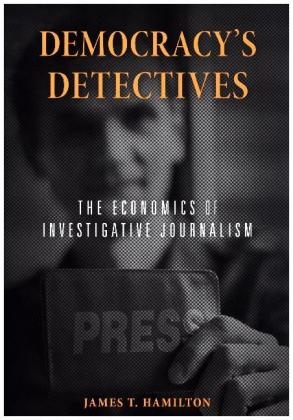
Democracy’s Detectives
The Economics of Investigative Journalism
Seiten
2016
Harvard University Press (Verlag)
978-0-674-54550-2 (ISBN)
Harvard University Press (Verlag)
978-0-674-54550-2 (ISBN)
- Titel ist leider vergriffen;
keine Neuauflage - Artikel merken
Investigative journalism holds democracies and individuals accountable to the public. But important stories are going untold as news outlets shy away from the expense of watchdog reporting. Computational journalism, using digital records and data-mining algorithms, promises to lower the cost and increase demand among readers, James Hamilton shows.
In democratic societies, investigative journalism holds government and private institutions accountable to the public. From firings and resignations to changes in budgets and laws, the impact of this reporting can be significant—but so too are the costs. As newspapers confront shrinking subscriptions and advertising revenue, who is footing the bill for journalists to carry out their essential work? Democracy’s Detectives puts investigative journalism under a magnifying glass to clarify the challenges and opportunities facing news organizations today. Drawing on a painstakingly assembled data set of thousands of investigations by U.S. journalists, James T. Hamilton deploys economic theories of markets and incentives to reach conclusions about the types of investigative stories that get prioritized and funded.
Hamilton chronicles a remarkable record of investigative journalism’s real-world impact, showing how a single dollar invested in a story can generate hundreds of dollars in social benefits. An in-depth case study of Pulitzer Prize–winning reporter Pat Stith of The News and Observer in Raleigh, NC, who pursued over 150 investigations that led to the passage of dozens of state laws, illustrates the wide-ranging impact one intrepid journalist can have. Important stories are going untold as news outlets increasingly shy away from the expense of watchdog reporting, Hamilton warns, but technology may hold an answer. Computational journalism—making novel use of digital records and data-mining algorithms—promises to lower the costs of discovering stories and increase demand among readers.
In democratic societies, investigative journalism holds government and private institutions accountable to the public. From firings and resignations to changes in budgets and laws, the impact of this reporting can be significant—but so too are the costs. As newspapers confront shrinking subscriptions and advertising revenue, who is footing the bill for journalists to carry out their essential work? Democracy’s Detectives puts investigative journalism under a magnifying glass to clarify the challenges and opportunities facing news organizations today. Drawing on a painstakingly assembled data set of thousands of investigations by U.S. journalists, James T. Hamilton deploys economic theories of markets and incentives to reach conclusions about the types of investigative stories that get prioritized and funded.
Hamilton chronicles a remarkable record of investigative journalism’s real-world impact, showing how a single dollar invested in a story can generate hundreds of dollars in social benefits. An in-depth case study of Pulitzer Prize–winning reporter Pat Stith of The News and Observer in Raleigh, NC, who pursued over 150 investigations that led to the passage of dozens of state laws, illustrates the wide-ranging impact one intrepid journalist can have. Important stories are going untold as news outlets increasingly shy away from the expense of watchdog reporting, Hamilton warns, but technology may hold an answer. Computational journalism—making novel use of digital records and data-mining algorithms—promises to lower the costs of discovering stories and increase demand among readers.
James T. Hamilton is Hearst Professor of Communication at Stanford University.
| Erscheinungsdatum | 17.10.2016 |
|---|---|
| Zusatzinfo | 2 line illustrations, 38 tables |
| Verlagsort | Cambridge, Mass |
| Sprache | englisch |
| Maße | 156 x 235 mm |
| Themenwelt | Literatur ► Essays / Feuilleton |
| Sozialwissenschaften ► Kommunikation / Medien ► Journalistik | |
| Sozialwissenschaften ► Kommunikation / Medien ► Medienwissenschaft | |
| Sozialwissenschaften ► Politik / Verwaltung ► Politische Theorie | |
| Sozialwissenschaften ► Soziologie | |
| Wirtschaft | |
| ISBN-10 | 0-674-54550-8 / 0674545508 |
| ISBN-13 | 978-0-674-54550-2 / 9780674545502 |
| Zustand | Neuware |
| Informationen gemäß Produktsicherheitsverordnung (GPSR) | |
| Haben Sie eine Frage zum Produkt? |
Mehr entdecken
aus dem Bereich
aus dem Bereich


